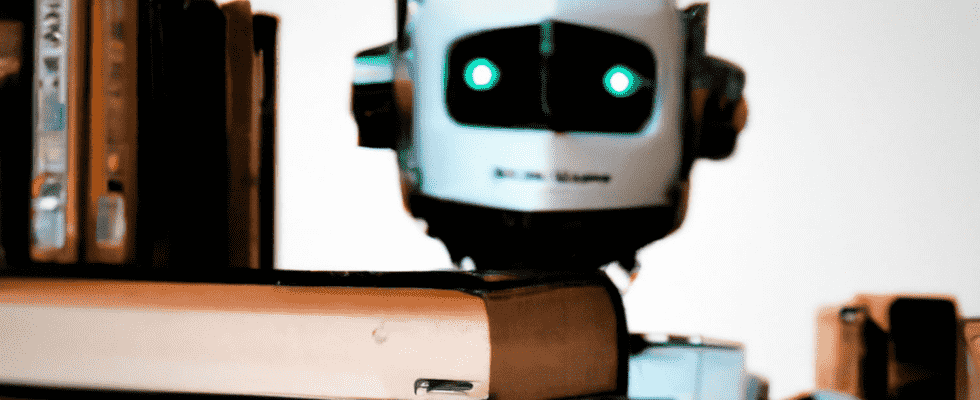With the success of ChatGPT, publishers and e-book platforms like Amazon find themselves overwhelmed with books written by or with AI. A phenomenon that worries the real authors…
ChatGPT, the conversational artificial intelligence capable of responding to many requests in a fluid and natural language, has been panicking the Web since its public release in November 2022, especially since it is accessible to everyone for free. And it didn’t take long before some were looking to exploit this technology for their own ends, sometimes to the detriment of any ethics. Many influencers and so-called experts were quick to see AI as the perfect tool to easily line their pockets, and so started posting videos or selling training to learn how to “become get rich quick” (see our article). Obviously, these “tips” didn’t fall on deaf ears, and smart guys decided to have books written entirely by ChatGPT – and even illustrated them using image generators like DALL-E or Midjourney, especially for children’s books.
On major platforms such as TikTok, Reddit or YouTube, there are also many tutorials that explain how to have an AI write a book in just a few hours on all kinds of subjects, whether manuals on the programming of software, travel guides, science fiction novels or educational advice. For the moment, the mediocrity of their quality makes it possible to distinguish them, but with the speed with which this technology is evolving, this may not last…
Books by ChatGPT: online publishing platforms overrun with pseudo manuscripts
Reuters investigated this new phenomenon and identified no less than 200 e-books mentioning ChatPT as author or co-author, not to mention all those whose “author” did not assume and indicate their approach, on the Kindle online store from Amazon. This makes it easy to self-publish your creation and recover money from sales – even if they are only a few dollars –, especially since the e-commerce giant offers to print the books itself. Since then, he has even added a category “Books on the use of ChatGPT” to Kindle, where there are many books on the subject, including in French. Asked by Reuters, Amazon did not say whether it plans to change its store’s policy regarding authors’ use of AI or other such tools, saying only through its spokesperson, Lindsay Hamilton, that “all books in the store must meet our content guidelines, including complying with intellectual property rights and all other applicable laws”.
By simply looking “ChatGPT” on the Amazon search engine, there are indeed many recent works referring to the OpenA chatbot. We can cite The ChatGPT AI Guide – User Manual – ChatBot: Everything you need to know about conversational artificial intelligencepublished by Max Tremblay with the mention “and ChatGPT 3” for the price of 9.50 € in paper and €4.95 in Kindle, Make Money with ChatGpt: Grow Revenue Fast with Artificial Intelligence | passive income | improve your business at 12.90 €, or ChatGPT For Dummies: A Complete Guide To Using AI at 16.50 €. This was written by a certain Leo Raphael Pineda, which has published no less than 15 books since December 2022, many of which revolve around ChatGPT – with a fairly similar front cover visual by the way. Same thing on the Fnac site, with many books dealing with the subject or co-written by ChatGPT. This is of great concern to the authors…
Books by ChatGPT: authors threatened by lack of legislation
With the success of ChatGPT, publishers find themselves overwhelmed with books. Neil Clarke, a science fiction and fantasy editor has been forced to stop accepting manuscripts for his journal Clarkesworld Magazine until further notice. “It got out of hand”he notes in a blog post. If, for the moment, it still manages to spot the texts generated by the AI because “there are very obvious patterns” – he blacklisted more than 500 “writers” suspected of having used ChatGPT – he worries about the future because “technology will only improve, so detection will become more difficult.” He is not the only one ! Many authors are very worried because they will have a hard time standing out by being literally drowned in the crowd.
“It’s something we really have to worry about. These books are going to flood the market and a lot of authors are going to be out of work.explains to Reuters Mary Rasenberger, executive director of the important group of writers The Authors Guild. “Ghost Writing (ghostwriting) by humans has a long tradition, but the ability to automate via AI could turn writing into a commodity. There needs to be transparency from authors and platforms about how these books are created, otherwise you’re going to end up with a lot of shoddy titles.” So far, generative AIs like ChatGPT have failed to generate quality texts without outside help. To arrive at a “correct” result, the user must bring many precisions, verify the words of the tool and completely rework certain parts.
The field of AI urgently needs regulation, so that authors and platforms are completely transparent about the involvement of technology in the creative process. Even if there are tools to detect texts produced by artificial intelligence, the process is tedious and it is possible to pass completely under the radar… The problem of plagiarism also arises. Indeed, the knowledge of AIs like ChatGPT draws from a huge database of written texts all over the Internet. Also, if the user’s query is very specific, the tool may inadvertently plagiarize part of an artist’s work – this often happens with image-generating AIs. They can also sometimes give completely false information, which is problematic in the context of a non-fiction story. For the moment, individuals who use chatbots to create texts operate in a gray area of law, which is why the authorities must react quickly and legislate on the subject.

